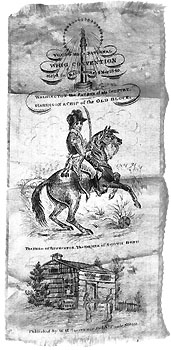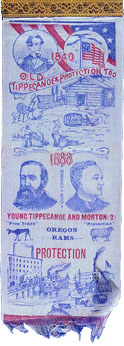![]()
A gradual development in the American process of electing a president
was the formation of political parties. Some of the Founders did not welcome
parties; there is no mention of the role or function of national parties
in the Constitution. They shared the eighteenth-century notion that parties,
or "factions," were injurious to a representative government.
Others disagreed and went on to form America's first political parties.
Historians continue to debate the precise evolution of American political
parties but generally agree that a viable national party system had emerged
by the late 1830s. National political parties brought together diverse local
and regional coalitions who wanted to voice their opinions in a national
forum. An important part of their strategy was to gain control of Congress
and the presidency.


William Henry Harrison, 1840 (left), and Benjamin Harrison, 1888 (right)
campaign ribbons. The party faithful often wore ribbons like these to show
their support for a candidate
The broadly based Democratic,
Whig,
and (later) Republican Parties were products
of the steadily expanding franchise, or right to vote, during the early
nineteenth century. By 1840, property restrictions for voting had largely
been repealed, enabling most white males over the age of twenty one to vote.
Throughout the nineteenth and twentieth centuries the electorate continued
to expand as people outside the system struggled to obtain the vote. The
franchise was extended to African American males in the 1870s (although
later severely restricted in some states), to women and Native Americans
by the 1920s, and to all eighteen-year-olds in the 1970s. Each influx of
new voters added strength to the political parties.
In addition to changing the dynamics of elections, the emergence of national
political parties created a new role for the president – that of party leader.
It was a position that many presidents found uncomfortable but necessary
to assume in their pursuit and exercise of the Executive office.
educate@si.edu